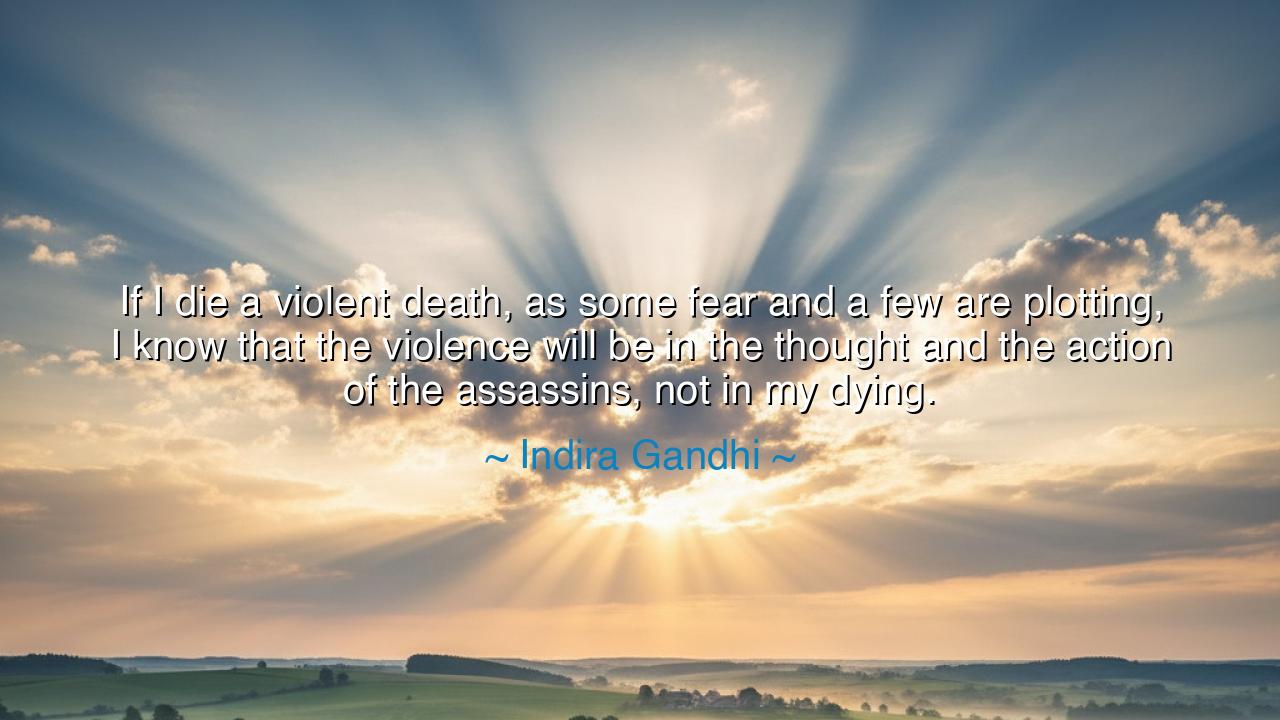
If I die a violent death, as some fear and a few are plotting, I
If I die a violent death, as some fear and a few are plotting, I know that the violence will be in the thought and the action of the assassins, not in my dying.






The words of Indira Gandhi, India’s first woman Prime Minister, are both prophetic and eternal: “If I die a violent death, as some fear and a few are plotting, I know that the violence will be in the thought and the action of the assassins, not in my dying.” These words, spoken with calm foresight before her assassination in 1984, shine with the dignity of a soul that has made peace with destiny. They are not the words of fear, but of transcendence. They reveal a mind that has risen above hatred, and a heart that understands that true strength lies not in the body’s endurance, but in the spirit’s serenity.
In these lines, Indira Gandhi distinguishes between the violence of men and the peace of the self. She acknowledges that while the act of killing is brutal, death itself need not be. For one who has lived in purpose, death cannot harm what is eternal. The violence belongs to the assassins, for it is born of hatred and ignorance; the peace belongs to the one who accepts her fate without bitterness. Thus, her words are not merely about her death, but about the nature of power, forgiveness, and the triumph of the human spirit. To meet violence with peace is the ultimate act of defiance against evil.
This quote was spoken during one of the most turbulent periods in India’s modern history. The country was scarred by internal unrest and political strife. Indira Gandhi, though revered by millions, faced fierce opposition and threats to her life. Yet she did not retreat. She walked unguarded among her people, aware of the danger that surrounded her. It was as though she had already conquered fear; she understood that to live in fear of death is to die every day, but to accept death is to live freely. When her own bodyguards took her life, as she had foreseen, her prophecy became truth—the violence was theirs, not hers. Her death was not a defeat, but a martyrdom that revealed the purity of her resolve.
The ancients taught that the soul is untouched by the weapons of the world. The Bhagavad Gita declares: “The soul is not born, nor does it die. Weapons do not cut it, fire does not burn it.” Indira Gandhi’s words flow from that same well of understanding. She saw that hatred can harm only the one who harbors it, not the one who receives it. By separating the violence of action from the peace of being, she turned her own death into a lesson for humanity: that greatness is not measured by how one lives in comfort, but by how one meets fate with grace.
Her words find resonance in other great lives as well. Consider Mahatma Gandhi, who too faced his assassins with no anger in his heart, greeting them with the words, “Hey Ram.” Like Indira, he believed that violence could never destroy truth. The assassins could silence the body, but not the idea. Both Gandhis—spiritual and political—understood that forgiveness is the last and highest form of power. It robs hatred of its victory and turns death into an act of renewal.
To hear Indira Gandhi’s words is to be reminded that courage is not the absence of danger, but the calm acceptance of it. She knew that her position made her a target, yet she chose to serve until her final breath. Her statement is a mirror held to the heart of every leader, every seeker, every human being: do not let fear or hatred dictate your actions. When you are rooted in truth, you need not fight for dignity—it follows you even beyond death. The body may fall, but the spirit, unyielding and radiant, lives on.
Lesson and Practice:
Let no act of cruelty, injustice, or betrayal taint your inner peace. When you are wronged, remember that violence lives in the doer, not in the victim. Hold your heart steady, and your soul will remain untouchable. Walk through life with the courage to face your fate with dignity, and meet hardship without hatred. Strive to live as Indira Gandhi did—with a mind unafraid, a heart unbittered, and a purpose unwavering. For those who conquer fear and forgive their enemies achieve the rarest victory of all—the victory of the spirit over suffering, the triumph of peace over violence, and the immortality of the soul over death itself.






AAdministratorAdministrator
Welcome, honored guests. Please leave a comment, we will respond soon